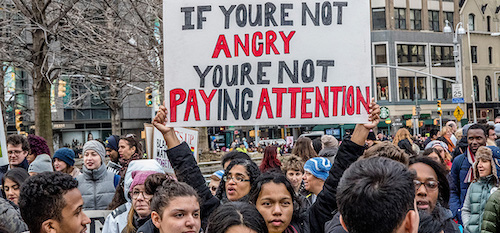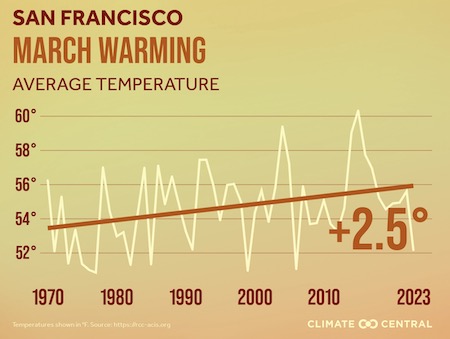I pondered my lukewarm-activist stance recently at a Passover seder. The hosts plan the seder to emphasize the relevance of Passover in today’s world. Passover is a holiday about freedom, so they encourage discussion about what it means to be free, what obstacles there are to freedom, and what responsibilities we have to help others to be free. They write their own Haggadah (the “manual” that is used for a seder), which makes for a more interesting evening than a dry recitation of a traditional seder.
Every few years they revise the Haggadah and this year there was an interesting new addition. The traditional seder talks about how to teach the meaning of Passover to four kinds of children:
- The wise and thoughtful child.
- The rebellious or skeptical child.
- The simple child.
- The child who doesn’t know how to ask.
I love this idea that you need to know your audience!
The updated Haggadah added a section on another four kinds of children when it comes to turning thoughts into action. “On Passover, it is not enough merely to learn; Passover demands that we act. But how? In the face of such enormous problems in our world, how should we act? How can we act? What do we say to our children when they ask us how to act?”
This seems like an important issue. Only a few days ago, the New York Times had an op-ed titled “The Rich World Has a Shockingly High Tolerance for Cruelty”. There’s a lot of room for improvement in how the world operates today and in how we are responding. Yet I know that my attention span for the disasters of the world is limited and I ignore things I shouldn’t ignore. The new Haggadah maps out four types of children and how to talk with them:
- The activist child. “Empower this child always to seek pathways to advocate for the vulnerable.”
- The skeptical child. “Encourage this child by explaining that they need not solve the problems, but must only do what they are capable of doing.”
- The indifferent child. “Remind this child that responsibility for such things cannot be shirked.”
- The uninformed child. “Teach this child that we are the inheritors of our people’s legacy.”

Source: Creative Commons
I found myself aching for a fifth kind of child. It seems too much to expect that we always seek ways to help the vulnerable, or even that we do everything we are capable of doing. In that regard, I could easily start by moving to a cozy apartment, donating the bulk of my savings to needy causes, and spending more of my free time writing letters to politicians. That would hardly constitute a sacrifice in the eyes of many. But it is beyond me. Not only do I not take enough action, I don’t even let myself become aware of, let alone get outraged about, so many wrongs. I say to myself that doing so allows me to move forward with other things.
It’s not just our capacity for outrage that causes me to question the seder’s advice. I wonder if “activist” is the correct aspiration here. Colloquially, at least, an “activist” is one to take a fairly black-and-white stance, and to protest from outside rather than build from inside. The host confirmed this: “I do think that activists are necessarily disenfranchised. If you have the power to change things and you change them, you’re not thought of as an activist. Lyndon Johnson got the Civil Rights Act of 1964 passed and signed into law, pressuring lawmakers, but no one would say he was an activist.” So, if people like Thurgood Marshall (as a judge) and Abe Lincoln (as a president) weren’t activists, then maybe we need a fifth child for them, and a sixth child for me?
In fact, I wonder if in this day and age, we don’t have more than enough activists and agitators, and too few vanilla people drafting policies and moving the needle more quietly. My patient host replied: “Do activists shout too much? Maybe. But maybe it’s a tactic they use to be heard because they are marginalized. A billionaire or a senator doesn’t need to shout.” True, but I give a lot of credit to people who use their money or clout to effect big positive change, if only because so many do not. I think it’s not as easy as it seems.
Suppose you aren’t disenfranchised or rich or powerful or effecting big change. The guy who installed my heat pump is not an activist -- he doesn’t even believe that climate change is a serious threat -- and I wouldn’t say he is disenfranchised. Nevertheless, he feels very strongly about energy efficiency. He got up to speed on hydronic heat pump technology years ago and has been working nonstop to install them for a while. He feels strongly that he is making the world better by helping people to use less energy. What kind of child is he? He works hard at a job that does a lot of good. But he is not fighting against injustice.
One of the guests at the seder said he spends a lot of time as a soccer referee. He enjoys it and thinks it does good. He certainly helps the kids (and parents?) learn sportsmanship. I’m not sure if he gets paid for the job or if he donates the income back to the organization. Does that matter? Does it matter if the kids on the teams are underprivileged or not? Or does he need to protest something?
The host looked at me quizzically as I was puzzling through this and asked where I was going with it all. Ha, good question. At the end of the day, I think people do best when they live their lives according to their values. Not according to someone else’s values, but according to their own values. If people have different values, that’s a good thing, and if people advocate for what they care about, that is also a good thing. (2)
Activism plays an important role. Activists can change the conversation. They can direct attention to a cause. They can even sway public opinion in their direction if they are skilled. After all, it’s hard to build a movement around milquetoast.
And yet, in my view, activists should be relatively rare. If they are not skilled, they can have the effect of shutting down conversations and even stoking the opposition. What I would like to see more of is people who can listen as well as talk, who can bring people together, build coalitions, and draft policies that are inclusive, multi-faceted, and get good buy-in. Whether these people are senators or underprivileged community members, this work is critical, difficult, and effective. (3)
Maybe what I’m looking for is this kind of child: “The child who tries.” This child works to discover their values, to evolve those values by listening to others (especially those who don’t agree), and to align their actions with their values, a little more each year. They can do this loudly or quietly, urgently or patiently, alone or with others. I would love to see a little more listening and a little less talking, a little more building and a little less tearing down, a little more togetherness and a little less divisiveness. And I worry. Diplomatic approaches don't drive likes and engagement on social media, and I am seeing that kids (and adults) increasingly default to noisier activism. It’s possible they don’t know and may not be capable of anything else. What happens if outrage becomes an increasingly dominant emotion?
Consider the Stanford Law School students who shouted down a judge who they didn’t agree with. I don’t love that type of activism. My host replied: “I’m not sure I’d call the students at Stanford Law School who shouted down a speaker “activists". That’s just shutting down speech. Instead, I think an activist approach to that situation is the creation of a forum that would invite different points of views to be aired to create the understanding necessary to drive change toward a more just society. To my mind, we need more activists, because we have so many problems that need fixing…. Their tactics are more nuanced than you think -- antagonistic and perhaps simplistic as needed to generate attention and engagement, but thoughtful and collaborative when that point has been reached.” That sounds promising, no?
What is your take on activism and activists? What would you like to see more of and less of?
Notes and References
1. Palo Alto has very few school buses, with the large majority of kids walking or biking to school (and, in the case of high school, driving or taking the VTA bus).
2. I think this is true up to a point. If everyone simply valued the dollar above all else, I don’t think it would lead to a great outcome. We see some of that today.
3. On reviewing a draft of this blog, the seder host wrote this about the potential for activists to stymie conversation: “Do activists shut down more conversation than people entrenched in positions of hierarchy? What Catholic leader took on sexism and child abuse on their own? How much speech did they stifle?” This is an important point. In other words, if there is no other way for the disenfranchised to lobby for their cause without some negative side-effects, then maybe that is the cost our society has to bear for having created so many powerless people with so many causes to fight for in the first place.
Current Climate Data (February 2023)
Global impacts, US impacts, CO2 metric, Climate dashboard

The folks from Climate Central share this information: “This March, San Francisco was much cooler than normal and much wetter than normal. The average temperature of 52.2°F was 3.3° below normal, and the 6.60 inches of precipitation was 242% of the normal amount… Despite this month being cooler than normal, Marches in San Francisco are getting hotter, leading to a change of 2.5°F since 1970.”
Comment Guidelines
I hope that your contributions will be an important part of this blog. To keep the discussion productive, please adhere to these guidelines or your comment may be edited or removed.
- Avoid disrespectful, disparaging, snide, angry, or ad hominem comments.
- Stay fact-based and refer to reputable sources.
- Stay on topic.
- In general, maintain this as a welcoming space for all readers.



